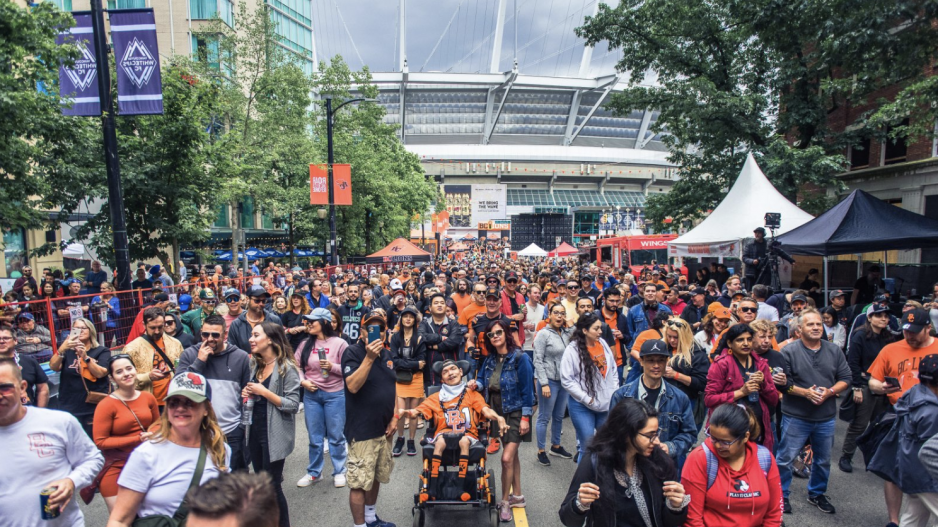A couple of years ago, with the entire world still going through the COVID-19 pandemic, professional sports franchises in B.C. seemed to be struggling.
Cancelled seasons, reduced schedules and games played in front of mask-wearing cameramen made it difficult to establish an emotional connection with franchises and players.
When Research Co. and Glacier Media asked British Columbians about professional sports in June 2021, the detachment from residents was palpable. The level of increased interest was in single digits for four teams: The BC Lions of the Canadian Football League (CFL) (eight per cent), the Vancouver Whitecaps of Major League Soccer (MLS) (also eight per cent), the Vancouver Giants of the Western Hockey League (WHL) and the Vancouver Canadians, who at the time played in baseball’s High-A West League (four per cent). Only the Vancouver Canucks of the National Hockey League (NHL) fared better, with 15 per cent of residents saying they were more interested than five years prior.
A lot has changed since 2021. Fans are back inside stadiums and arenas, and there is renewed energy for two professional franchises. The BC Lions have been under new management since August 2021, and have won seven of their first nine games in the current CFL season. The Vancouver Whitecaps welcomed two Mexican teams to BC Place as part of the North American Leagues Cup and are hoping to improve on their average game attendance in 2022 (16,399 fans, compared to an MLS-average of 21,006).
Our latest survey clearly outlines positive momentum for these two teams. Across the province, 12 per cent of British Columbians say they are paying more attention now to the Lions and the Whitecaps than five years ago. The Canucks are at 14 per cent on this indicator, with the Canadians and Giants once again in single digits (six per cent and four per cent respectively).
There are some nuances in the way British Columbians are approaching the province’s premiere football and soccer franchises. For the Lions, interest has risen by 15 per cent among residents aged 18 to 34 and by 13 per cent among their counterparts aged 55 and over, but only by 10 per cent among those aged 35 to 54.
The CFL has had a complicated time selling the game to younger Canadians in this century, partially due to the increased presence of the National Football League (NFL) on Canada-wide television broadcasts. A winning team on the field is certainly helping generate more fan interest locally than in 2021.
For the Whitecaps, increased interest diminishes with age across British Columbia: 17 per cent for those aged 18 to 34, 11 per cent for those aged 35 to 54 and nine per cent for those aged 55 and over. The MLS franchise has emphasized the concept of family outings at BC Place, even if local fans seemed to be outnumbered by supporters of Mexican teams León and Tigres during the Leagues Cup earlier this summer.
With the World Cup coming to Vancouver in 2026, interest in soccer can grow exponentially. It is still unclear which games will be hosted at BC Place, but we could safely assume that Team Canada will prefer to play in front of more than 50,000 fans in Vancouver than at a smaller venue in Toronto. A pending issue at BC Place is the installation of natural grass to replace the current synthetic surface that most international players dread.
More than a decade has passed since the Canucks played in the Stanley Cup Finals, and the team has not qualified for the playoffs in each of the past three seasons. When British Columbians are asked which sports team more accurately represents the province, the Canucks are still in first place with 55 per cent, down eight points since 2021. There is growth for the Lions (16 per cent, up six points) and the Whitecaps (seven per cent, up three points), but not for the Giants (two per cent, unchanged) or the Canadians (one per cent, unchanged).
The Canucks remain the undisputed leader in merchandise, with just over a third of British Columbians (34 per cent, down three points) saying they own apparel from the franchise. Only two other teams are in double digits: The Lions (14 per cent, down one point) and Major League Baseball’s Toronto Blue Jays (13 per cent, up two points). Fewer of the province’s residents have something with the logos of the NFL’s Seattle Seahawks (eight per cent, down one point) and the Whitecaps (eight per cent, up one point).
In the era of immediate communication and competing interests, building up a fan base takes time. B.C. is not an exception to what has transpired in other cities, provinces and states across North America. The viability of both the CFL and the MLS was uncertain during the pandemic, but now we see more interest from the province’s residents on what the Lions and Whitecaps are doing. The increase in fan attention is not overwhelming, but that might change if championship teams are ultimately assembled.
Mario Canseco is president of Research Co.
Results are based on an online study conducted from July 29 to Aug. 1, among 800 adults in B.C. The data has been statistically weighted according to Canadian census figures for age, gender and region in British Columbia. The margin of error is plus or minus 3.5 percentage points, 19 times out of 20.



